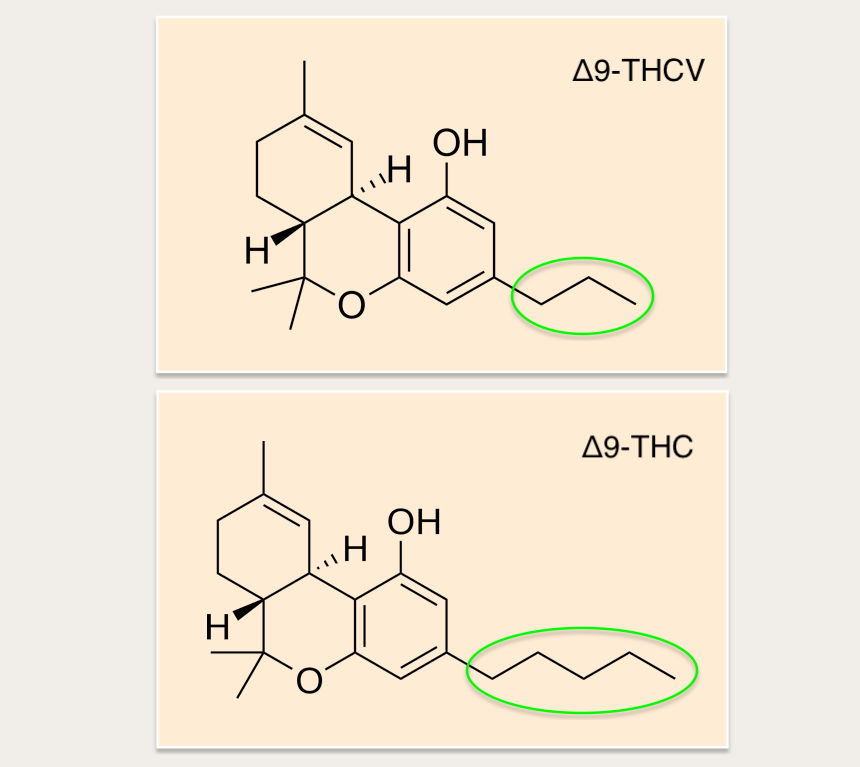Tetrahydrocannabivarin (THCV) is a cannabinoid compound found in cannabis and hemp plants. It's chemically similar to tetrahydrocannabinol (THC) however with some crucial distinctions. Here's everything you need to learn about THCV including the dangers, benefits, differences, and similarities with other types of THC and more. What Is THCV? THCV is a less common cannabinoid found in some strains of marijuana, especially African sativa.
 Tetrahydrocannabivarin (THCV) - Original FARM
Tetrahydrocannabivarin (THCV) - Original FARM
 THCV - The Cannabinoid of the Month at Champlain Valley Dispensary
THCV - The Cannabinoid of the Month at Champlain Valley Dispensary
 What Is THCV (Tetrahydrocannabivarin) And What Does It Do?
What Is THCV (Tetrahydrocannabivarin) And What Does It Do?
THCV has a 3-carbon side chain instead of THC's 5-carbon side chain. This difference is subtle, however it has a visible effect on the effect profile. THCV is somewhat psychoactive however just about and about. What Does THCV Seem like? THCV has a strong energy-boosting element to it, which makes it specifically popular amongst students and professional athletes.
In the United States, THCV regulation is nuanced. THCV is not a Schedule I Drug, but marijuana extracts are making it somewhat uncertain what the federal position is on THCV. The 2018 Farm Expense mentions that hemp plants and all derivatives of the plants are legal on a federal level, so numerous companies follow this law and still provide THCV to customers by only extracting the substance from hemp plants.
If THCV is thought about a THC analog, it might be controlled in the future by the same rules as THC under the Federal Analog Act. This act mentions that any compound that shares a comparable molecular profile as a known forbidden compound it's included in the very same drug Set up category.
What Are the Effects of THCV? Advocates of THCV report that it produces an intense burst of energy and makes them feel euphoric how do i make a thcv tincture? without the mental cloudiness brought on by THC. The effects are extremely moderate compared to THC. The impacts are almost specifically cognitive yet in some way have extremely little influence on headspace.
2. THCV & Hunger Some THCV users claim that it curbs their appetite. This is a common effect of other focus-enhancing substances too. It's as though THCV gets rid of the diversion of other bodily procedures (like hunger) in order to protect resources and attention to cognitive tasks instead. How Does THCV Work? Cannabinoids produce biological effects in the body by connecting with endocannabinoid receptors.
CB1 receptors lie in the anxious system and communicate with neurotransmitters in the brain to produce mind-altering results. Interaction with CB1 websites is what gives some cannabinoids like THC their psychoactivity. THCV is a bit tricky to comprehend because it's mostly a CB1 villain, suggesting it has the opposite result as THC.
While researchers are still seeking to understand this process, it appears THCV has the ability to obstruct the effects of CB1 in low dosages and stimulate them in high dosages. CB2 https://tfsites.blob.core.windows.net/whatisthcv/How-To-Get-Thcv-Out-Of-The-Plant.html receptors are discovered mostly in the immune system. THCV is a partial agonist of CB2, but the impacts of this partial activity aren't well-known, and it seemingly has no noticeable effect on THCV users' experience.
As pointed out in the previous section, THCV is a CB1 antagonist in low doses which is the precise opposite effect of delta 8 and delta 9 THC. This could indicate that THCV neutralizes a few of the psychedelic effects of THC. This result could explain why people who utilize THCV feel so clear-headed especially compared to the well-known "fogginess" induced by delta 9 THC.